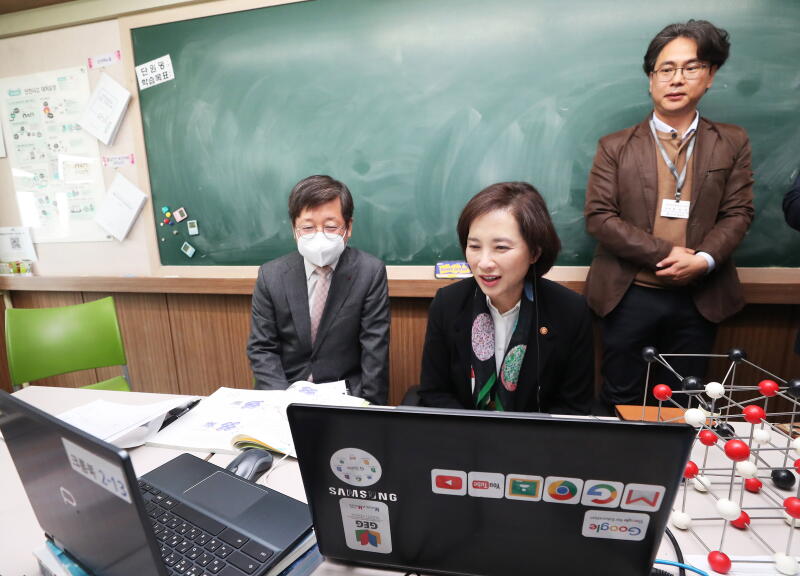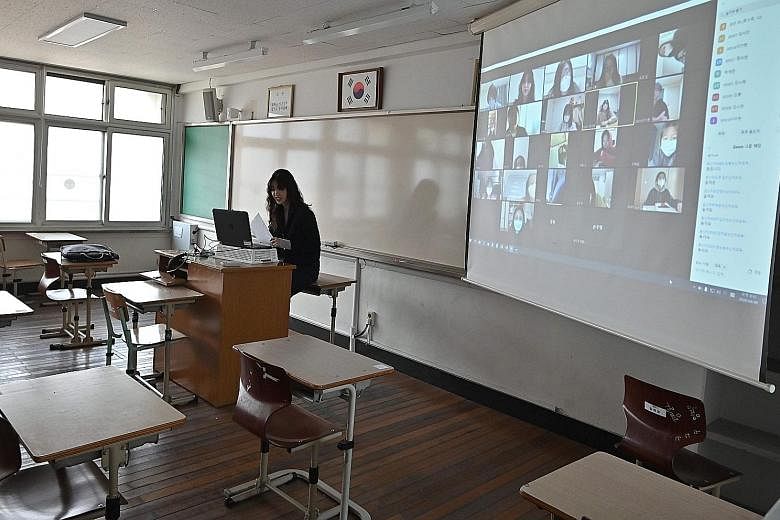Tens of thousands of South Korean teenagers logged on yesterday for remote learning as the much-delayed new academic year began in phases, while the number of new coronavirus cases dropped to the lowest in seven weeks.
Schools remain closed physically, but teachers for the third and final year of middle and high school turned up to hold virtual lessons.
Students aged 15 and 18 tuned in to lessons livestreamed on platforms such as Google Classroom and Zoom from home, as the government continued to battle the virus that has so far infected 10,423 people and killed 204 of them.
Thirty-nine new cases were reported yesterday - the lowest in the seven weeks since a community outbreak exploded in the south-eastern city of Daegu.
Daily new figures have hovered around 50 for four consecutive days, as the government strengthened social distancing measures to curb the spread of the virus.
The measures, which include keeping a 2m distance from other people when out, have been extended to April 19.
Vice-Health Minister Kim Gang-lip warned against complacency, even as he thanked medical workers for their sacrifice and efforts in helping to slow down the outbreak.
Mr Jeong Eun-kyeong, director-general of the Korea Centres for Disease Control and Prevention, urged people to stick to social distancing measures "because an explosion of large-scale infections could happen again at any time".
The new school year, which was supposed to start on March 2, was delayed by at least five weeks due to fears of mass infection.

Online learning, which will expand over the next two weeks to include all elementary, middle and high schools, got off to a relatively smooth start, said local reports.
Teachers at Seoul Girls High School were seen standing in front of empty classrooms from about 8am, taking attendance online before proceeding to conduct lessons.
Teething problems at some schools included delays in classes on the state-run Educational Broadcasting System Online due to technical issues and missing sound in pre-recorded video clips.
Education Minister Yoo Eun-hae has urged students, parents and educators to work together to make online learning work, stressing the importance of preventing schools from being potential breeding grounds for the virus.
"We believe schools should not stop teaching students amid a crisis," she said in a statement.
Schools can choose from three modes of online learning - interactive, real-time learning via video conferencing, content-based learning based on videos produced by the school, and assignment-based learning whereby students are given projects or reports to do.
Prime Minister Chung Sye-kyun has pledged to ensure remote learning goes well, adding that "we will do our best to stabilise the situation so our children can go to school".
Meanwhile, the government is set to toughen measures to prevent people from breaking self-quarantine rules. Self-quarantine is compulsory for anyone who enters the country from April 1. Offenders can face a fine of up to 10 million won (S$11,700) or up to a year in jail.
A 40-year-old Indonesian national was deported on Wednesday for breaking the rules, the first foreigner to be punished for doing so.
The Justice Ministry is now considering deporting three Vietnamese students caught leaving their homes in Gunsan city, south-east of Seoul, last week. They had left their mobile phones behind to avoid GPS tracking by the local health authorities.
The government has also proposed using electronic wrist tags on people put under quarantine.
A poll by Realmeter showed that eight in 10 people surveyed support the idea, but South Korea's Human Rights Commission has urged against it, arguing it can infringe a person's basic human rights.











